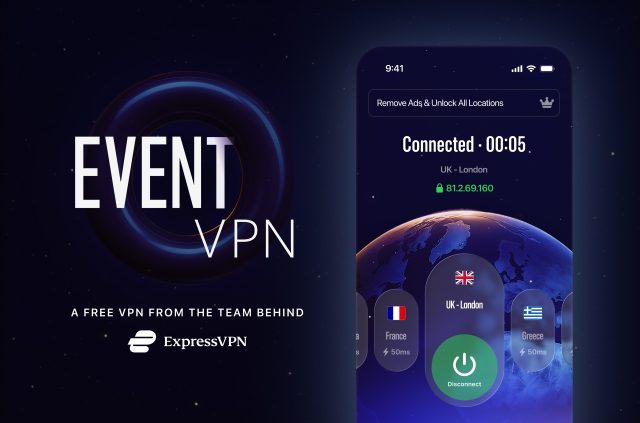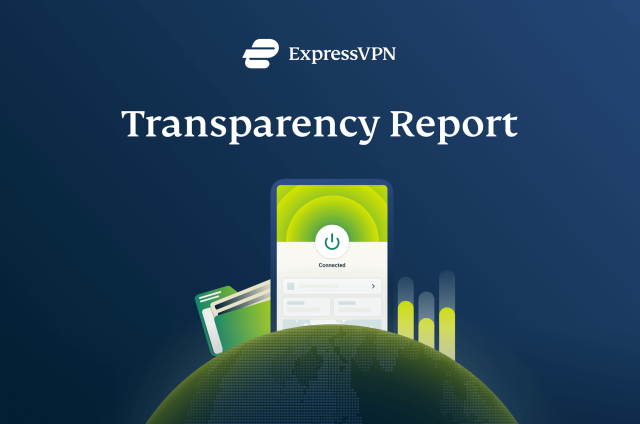How to spot (and avoid) listings for jobs that don’t exist


- Ghost jobs, which are job postings for roles that are not actively being hired for, can be a hindrance for job seekers who waste time and effort applying for them.
- A study by Clarify Capital found that while many employers keep ghost jobs listed just in case a good candidate applies, 43% of ghost job posters do so to give the impression that the company is growing.
- Diana Nevzoreanu, Talent Acquisition Lead at ExpressVPN, emphasizes the erosion of trust in the job market due to ghost jobs.
- To avoid ghost jobs, job seekers should thoroughly research companies, scrutinize job listings for vague descriptions, and use job tracking tools to monitor applications.
- Using a high-quality VPN, such as ExpressVPN, is advised for enhancing privacy and security during online job searches.
In February 2024, the U.S. unemployment rate was at 3.9%, its highest in two years. Among the challenges job seekers face trying to navigate job listings, product applications, and prepare for interviews, a new obstacle has emerged: ghost jobs.
These “fake” job postings could be a contributing reason to why 6.46 million Americans are unemployed. When you think about the time sunk into job applications, that’s a lot of time being wasted on what could be non-existent opportunities. Plus, there’s the emotional toil of thinking you’re applying for a job that you’re perfect for, only to never hear back because that listing turned out to be disingenuous.
This concerning trend points to a bigger problem: can you really trust job ads? And how do you even find a real job out there? We’re cutting through the noise, delving into the world of ghost jobs, as well as giving you tips on how to spot them, avoid them, and make the most out of your job search so you can land your dream role.
Jump to...
What are ghost jobs?
LinkedIn and other platforms play a role
Ghost jobs vs. job scams
How to avoid being haunted by ghost jobs
Strategies for employers
What more needs to be done about ghost jobs
What are ghost jobs?
They're not as spooky as they sound, but ghost jobs are frustratingly real in the job market. Think of them as job postings that are more of a mirage than an actual opportunity. They fall into two main categories:
- Unintentional listings that linger because someone failed to take them down
- Deliberate postings with no immediate intent to hire
A study by Clarify Capital, a financial consultancy in New York, has shed some light on the phenomenon. Surveying over 1,000 hiring managers, they found the most common timeframe of a job being listed was for two to three months, with 10% reaching six months or longer.
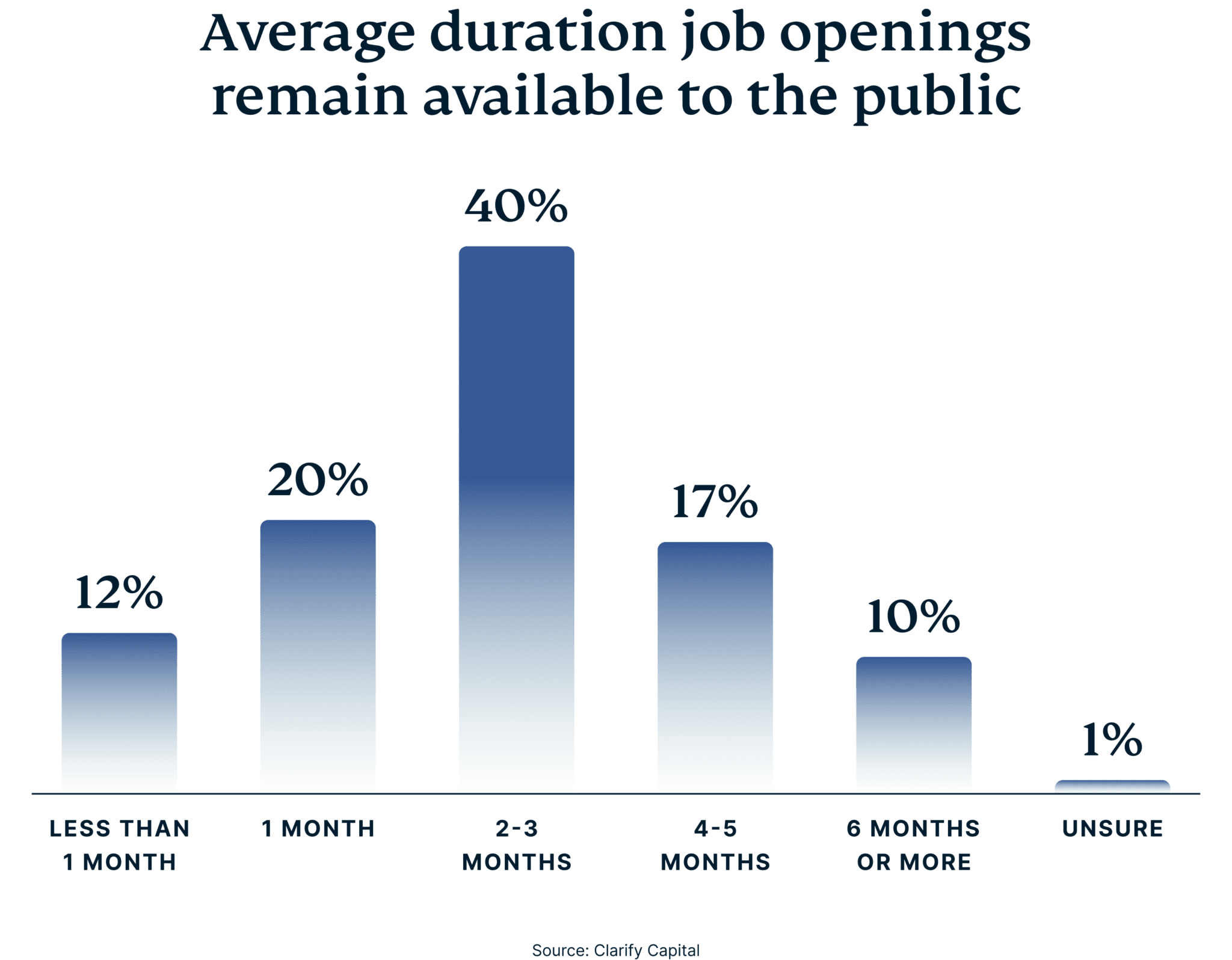
Reasons hiring managers post ghost jobs
The study also sought out hiring managers who’ve left jobs posted even when not actively hiring and asked for their reasons for doing so. The most common reason was to attract new people despite not actively needing them. But some employers use them to appear more dynamic and growing, both to current employees and outside observers. Others see them as a way to build a resume bank, a resource they can dip into whenever a real need arises.
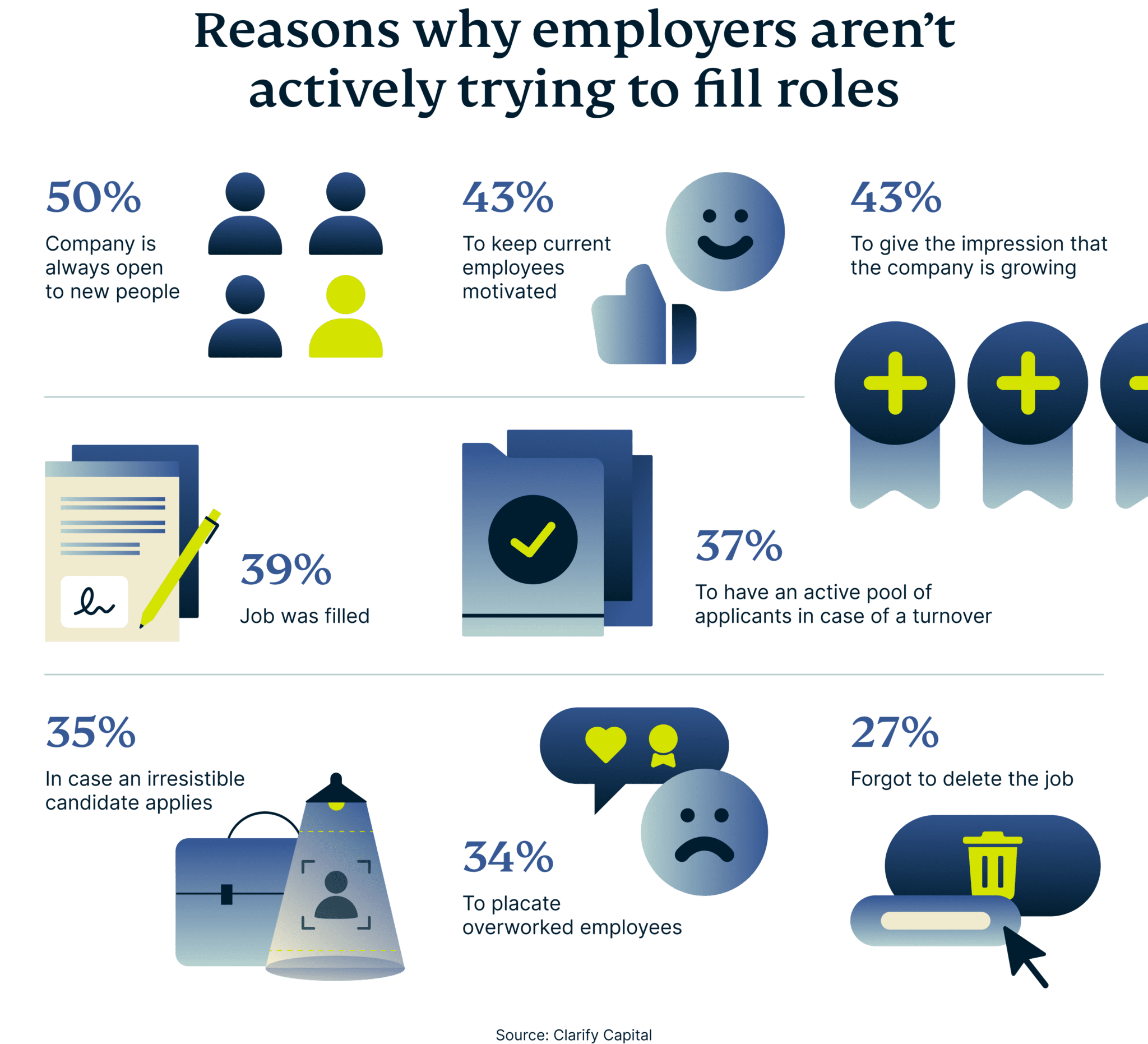
Why does this matter? “For starters, it points to a deeper issue of trust in the job market,” says Diana Nevzoreanu, Talent Acquisition Lead at ExpressVPN. “Think about the impact on job seekers. It's about wasted time and the erosion of confidence in the system. Job seekers might start questioning the legitimacy of all job postings, wondering if applying is even worth the effort.”
1 in 10 hiring managers has had a job opening for more than 6 months
This practice also has implications for the perceived dynamism of the job market. On paper, the economy might seem like it's booming with opportunities, but the reality for job seekers can be starkly different.
“After numerous layoffs at my current tech company, it felt like a ticking clock, pushing me to find something new,” an IT professional who wished to be unnamed tells ExpressVPN. “In the past four months alone, I've applied to roughly 120 jobs, hoping to land something more stable. The response has been a small number of rejections, with the majority of my applications vanishing into thin air.
“What's even more disheartening is seeing these positions still advertised as open, months after I've applied. It's like my efforts are just being absorbed by a big black hole. I've even tried applying for roles well below my current level as I’m desperate for a change, but it's the same silent treatment. It's incredibly frustrating to see opportunities that seem within reach remain constantly out of grasp.”
“It’s disheartening to see these positions still advertised as open, months after I've applied. It's like my efforts are just being absorbed by a big black hole.”
A paralegal tells us: “I graduated at the end of 2022 with the belief that I’d step straight into the job market, ready to start my career. Over a year later, I’m working as a cashier to make ends meet, still trying to land my first professional role. Despite sending out thousands of applications, the silence I've received is deafening.
“On the rare occasions I do receive a response, it's to tell me I'm not experienced enough—even for positions where I meet every listed qualification. This relentless cycle of hope and rejection is exhausting. It's as if the job market is impenetrable, with ghost jobs probably keeping me and many others from even getting a foot in the door.”
LinkedIn and other platforms play a role
LinkedIn and other job platforms have become the modern-day arenas for the ghost job spectacle. These platforms, designed to connect job seekers and employers, can unfortunately also serve as a dumping ground for ghost job postings.
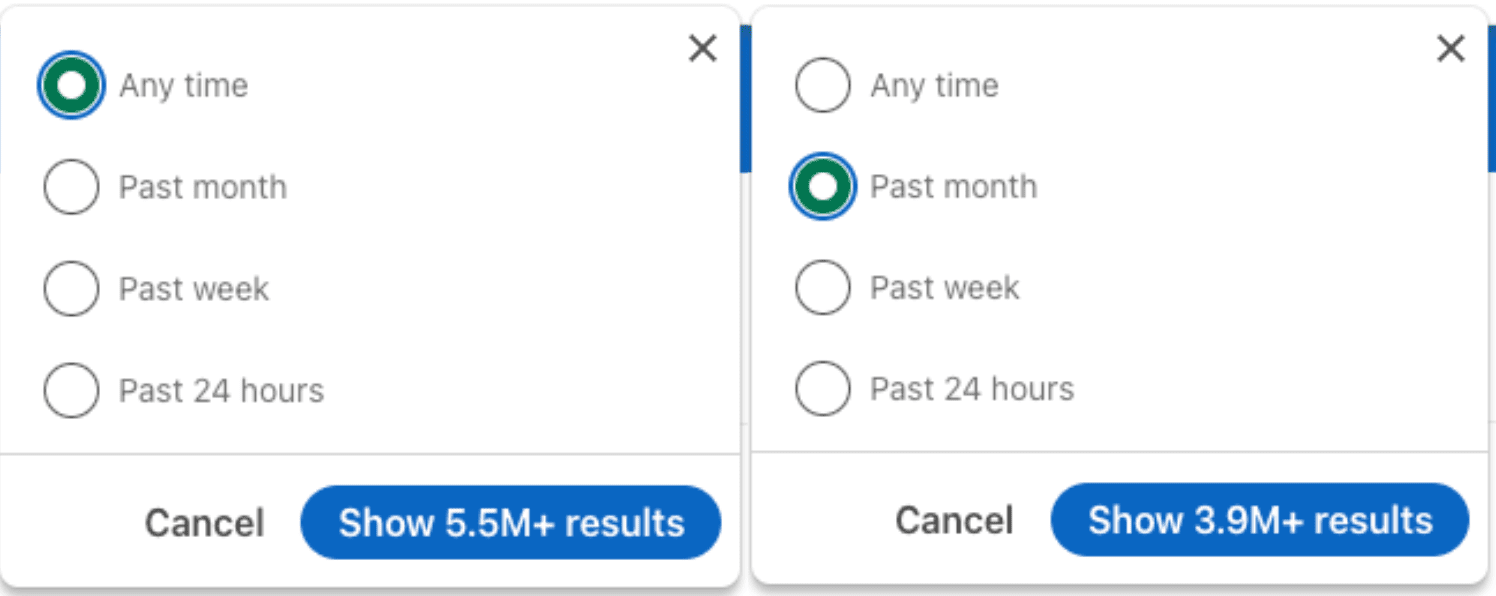
Nevzoreanu says, “LinkedIn, with its vast network, is particularly noteworthy. Its reputation as a professional networking site makes it a trusted source for job opportunities. But this trust can be exploited. Employers and recruiters can easily post jobs without immediate plans to hire, contributing to the ghost job phenomenon.”
Ghost jobs vs. job scams
But the issue goes beyond ghost jobs. LinkedIn and similar sites are also playgrounds for more sinister scams. Fake recruiters might post non-existent jobs to collect personal information from unsuspecting job seekers. Or, they might use the guise of a job offer to lure individuals into sending money for “training” or “equipment,” with no real job waiting at the end.

These scams are a dark reflection of the ghost job issue. Both exploit the hopes of job seekers, but while ghost jobs waste your time, scams can hit your wallet and your privacy. It's a double whammy—dodging not just the time traps of ghost jobs but also the potentially more damaging cons that lurk on these platforms.
| Feature | Ghost jobs | Job scams |
| Intention | May not have immediate hiring plans but are not designed to defraud. | Aim to deceive or defraud job seekers. |
| Common purpose | To build a talent pool or give the appearance of growth. | To obtain personal information or money from job seekers. |
| Financial implications for job seeker | None directly, though may lead to wasted time and effort. | Often leads to financial loss or identity theft. |
| Legitimacy of the company | Often real companies with potential future opportunities. | Frequently fake companies or misrepresented real ones. |
| Communication | May engage in initial communication but rarely follow through. | Often aggressive in communication, pushing for personal information or payments. |
Tips for finding genuine job listings
If you’re tired of chasing shadows in your job search, then follow these steps to learn how to sidestep ghost jobs and zero in on genuine opportunities:
1. Do your homework
Start with research. Companies with real jobs often have an active online presence. Check their official website and social media for hiring announcements. If the job listing doesn't match up with what's on their official channels, you might be looking at a ghost. Real job postings often come with detailed descriptions about the role, the team, and the company culture. Vague postings? Big red flag.
2. Look out for random requirements
Keep an eye out for listings that lack specifics, such as unclear job duties or requirements that seem too broad. Genuine job ads usually have detailed responsibilities and qualifications. If it reads like it could apply to anyone, it probably isn't looking to apply to someone specific.
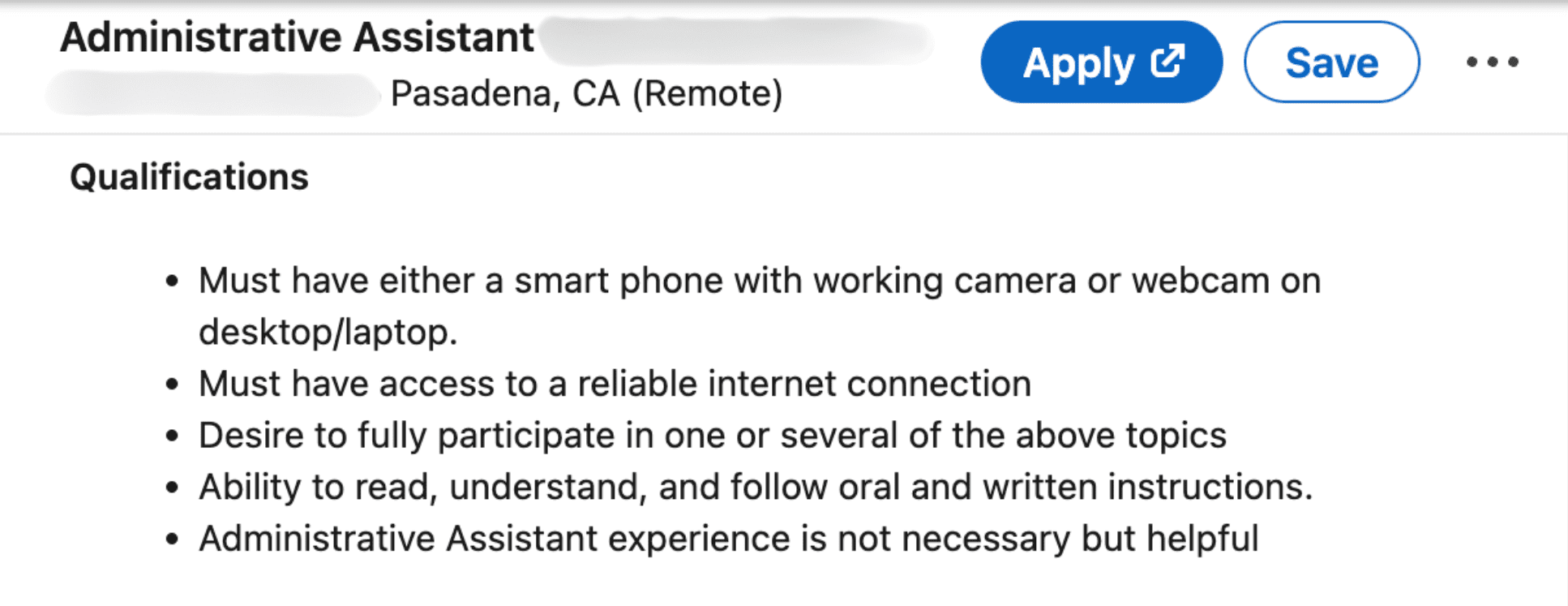
3. Check the posting date
A job that's been posted for months on end, reappearing like clockwork, could be a ghost. Companies actively hiring strive to fill roles within a reasonable timeframe. Long-standing listings that keep popping up could be kept there to gather resumes rather than fill an immediate opening.
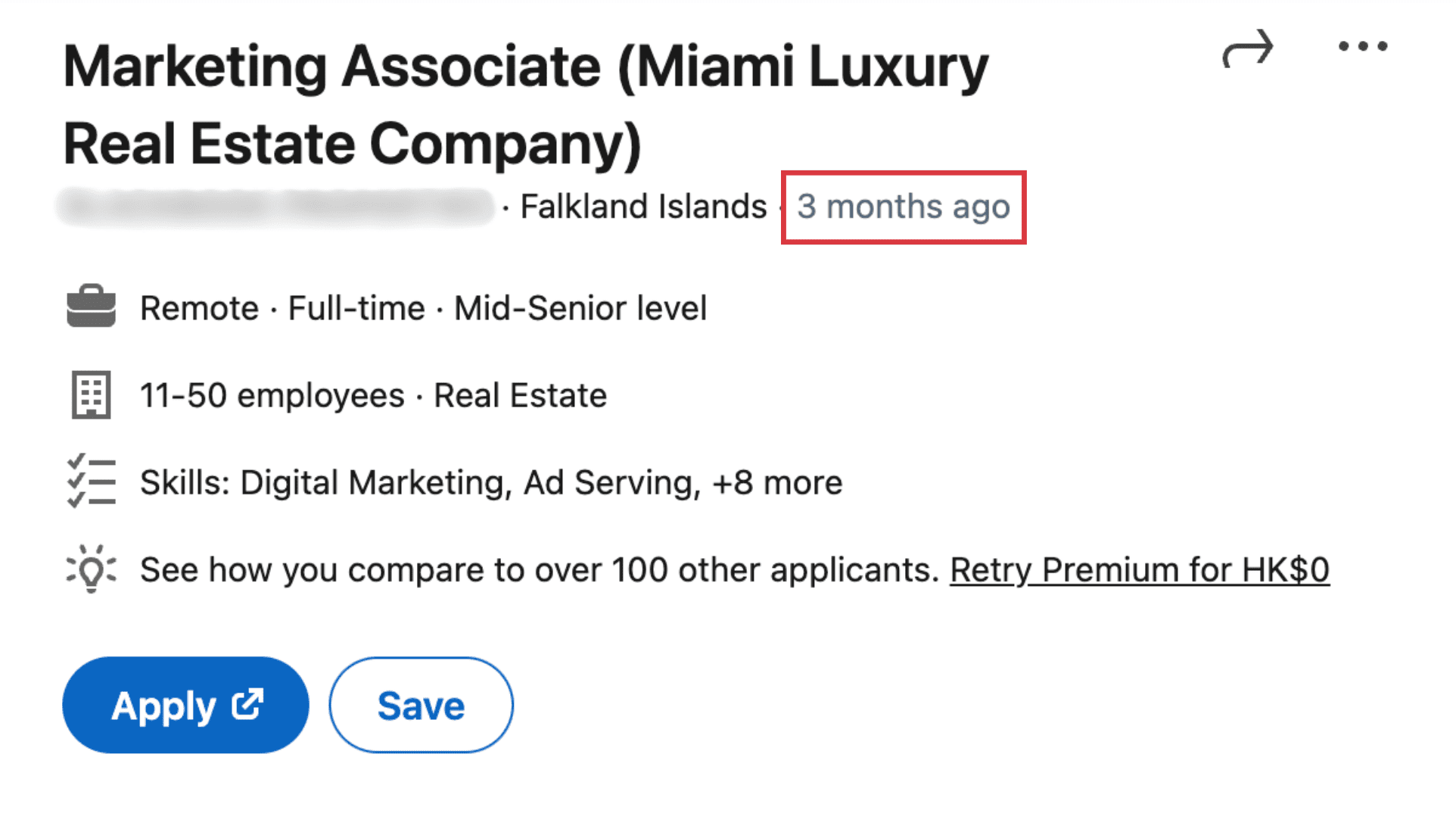
4. Note if the perks are realistic
Also be cautious of jobs that offer significantly higher pay but few requirements. Ghost jobs typically include a long list of perks to convince you to apply, but offer little detail on what your everyday duties will be.
5. Scrutinize the follow-up
After applying, a follow-up can reveal much about the job's legitimacy. Companies serious about hiring will have a structured recruitment process. If your follow-up emails or calls disappear into the void or the responses are non-committal, it might be a ghost job.
6. Leverage job tracking tools
Use job tracking tools or even a simple spreadsheet to keep tabs on the positions you've applied for, including application dates and any communication you've had with the employer. This can help you identify patterns, such as companies that never respond, which could be a red flag for ghost jobs.
7. Use a VPN for privacy
When searching for jobs, especially in public or unsecured Wi-Fi networks, consider using a premium VPN like ExpressVPN. A VPN encrypts your internet connection, safeguarding your personal information from hackers and ensuring that your job search activities remain private. This is essential when submitting resumes and personal details to potential employers.
8. Set up Google Alerts
Stay informed about the companies you're interested in by setting up Google Alerts. This way, you'll receive updates on any new content related to these companies, helping you to spot any inconsistencies in job postings or to gather more information that can validate the legitimacy of a job offer.
Strategies for employers
Ghost jobs aren't just a nightmare for job seekers; they haunt employers too, casting long shadows over their credibility and employer brand. Nevzoreanu offers the following tips on how companies can avoid becoming part of the problem and instead contribute positively to the job market:
Understand the impact on your brand
The continuous posting of ghost jobs can tarnish a company's image, making it seem unreliable or deceitful in the eyes of job seekers. This perception can spread quickly, especially on social media and employer review sites like Glassdoor, potentially deterring top talent from applying to genuine openings in the future.
Commit to transparency
Ensure your job postings are always current and reflect genuine hiring needs. If a position is filled or no longer available, remove the listing promptly. Transparency goes a long way in building trust with potential applicants. If you're collecting resumes for future possibilities, be upfront about it. Consider creating a talent pool or community where potential candidates can express interest in future opportunities without the confusion of a specific job post.
Ethical practices in job postings
Be precise and truthful in your job descriptions. Avoid using postings as fishing expeditions to gauge interest or market salaries. This practice not only wastes job seekers' time but can also lead to legal issues and damage to your company's reputation if perceived as deceptive.
Handling ghosting from both sides
Ghost jobs and ghosting are two sides of the same coin. Employers can take proactive steps to address this by improving communication with candidates throughout the hiring process, offering constructive feedback to unsuccessful applicants, and fostering a culture of respect and openness. Acknowledge the time and effort candidates put into their applications. Even a simple automated response can mitigate feelings of being ignored or ghosted.
Foster a positive candidate experience
Creating a positive experience for all applicants, irrespective of the outcome, can turn even rejected candidates into brand advocates. This means clear communication from the application receipt to the final decision, timely updates, and respectful engagement.
Leverage technology wisely
Use applicant tracking systems and CRM tools responsibly to keep potential candidates informed and engaged, but avoid bombarding them with irrelevant communications. Technology should enhance the recruitment process, not depersonalize it.
Feedback loops
Encourage feedback from candidates about their application experience and use this data to continually improve your processes. This can help identify any unintentional barriers or negative perceptions forming around your hiring practices.
What more needs to be done about ghost jobs
While it's a good start for job seekers and employers to take steps against ghost jobs, the buck doesn't stop there. Platforms like LinkedIn and other career sites have a massive role to play too. Career platforms need to beef up their game. Nevzoreanu tells us how:
- More rigorous checks and balances before a job is posted could be a game-changer. Imagine a world where every job listing is verified for its authenticity. It'd save everyone a lot of time and headaches. Plus, these platforms could use their tech prowess to spot and flag potential ghost jobs automatically.
- Transparency is also a necessity. Platforms can lead the charge by requiring more details from employers about the job status and making it mandatory to update the job's progress. Did someone get hired? Great, let's see that status change in real-time.
- There's also nothing like arming people with knowledge. Platforms have the reach and resources to educate both employers about the impacts of ghosting jobs and job seekers on how to spot them. Quick guides, tips, webinars—you name it. The more informed the user base, the harder it gets for ghost jobs to thrive.
- Creating a culture of feedback where job seekers can report or review their application process could deter employers from posting ghost jobs. If a job posting turns out to be a ghost, letting others know could prevent them from wasting their time.
Beyond career platforms
It’s not just about the actions of employers and vigilance among job seekers. Policymakers could also potentially regulate job ad practices to ensure fairness and transparency in the job market.
“There also needs to be a cultural shift in the job market,” says Nevzoreanu. “More dialogue between job seekers, employers, and the platforms they use can help create a more honest and efficient hiring process.”
Have you come across ghost jobs, or are you battling to find opportunities online? Share your experiences and strategies in the comments below.
FAQ: About ghost jobs
What is a ghost hire?
What is ghosting at work?
Ghosting can also occur during the hiring process when a job applicant stops responding to communication after an interview or even after accepting a job offer.
What happens if I just ghost my job?
- Professional reputation damage: Your reputation in the industry could be significantly harmed, making it harder to secure future employment. Employers often seek references or inquire about previous employment, and ghosting could lead to negative feedback.
- Lost references: You may lose valuable professional references. Positive endorsements from past employers are crucial for career progression, and ghosting could result in losing these endorsements.
- Impact on colleagues: Your sudden departure can put extra pressure on your colleagues who may have to cover your responsibilities, potentially straining professional relationships.
- Legal and financial repercussions: Depending on your contract and local labor laws, there might be legal or financial consequences, such as forfeiture of owed payments or benefits. In some cases, companies could take legal action if your departure breaches the terms of your employment contract.
- Difficulty in future job searches: Future employers might conduct background checks or reach out to previous employers. If it’s discovered that you ghosted a previous job, it could raise red flags about your reliability and professionalism.
- Psychological impact: The guilt or stress from ghosting an employer can also have a psychological effect, impacting your self-esteem and professional identity.
What is an example of a fake job offer?
- Job description: The offer may describe a vague or overly simplistic job role, such as data entry, package reshipping, or mystery shopping, with promises of high pay for minimal effort.
- Immediate hiring: The message asserts that you've been immediately selected for the position without a formal interview process, often citing your resume or profile on a job platform as the basis for this unsolicited offer.
- Request for personal information: The scammer may ask for personal details such as your full name, address, Social Security number, or bank information under the guise of setting up direct deposit or completing HR paperwork.
- Payment requests: The offer might include a request for you to pay for training materials, software, or a background check upfront, promising reimbursement later.
- Unprofessional communication: The email or message may contain grammatical errors, use a generic greeting (e.g., "Dear applicant" instead of your name), or come from a suspicious email address that doesn't match the company's official domain.
- Urgency: The scammer pressures you to accept the offer and provide the requested information quickly, often citing a limited-time opportunity.
Example Email: Subject: Immediate Job Offer - [Your Name]
Dear Applicant,
Congratulations! Based on your LinkedIn profile, our recruitment team at [Fake Company Name] has selected you for the position of Remote Data Entry Clerk. This position offers a starting salary of $5,000 per month, plus benefits, for just a few hours of work each week from the comfort of your home.
To proceed, please reply with your full name, address, and banking information for salary setup. Also, a small fee of $50 is required for your training materials, which you'll be promptly reimbursed for on your first day.
We are excited to have you join our team and look forward to your prompt response to secure this lucrative opportunity.
Best regards, [Scammer's Name] [Fake Company Name] Recruitment Team
If you encounter a job offer like this, be highly skeptical and conduct thorough research before responding or providing any personal information. Real job offers will involve a clear application process, professional communication, and never require payment from candidates.
What to do if you get scammed by a fake job?
- Report the scam Federal Trade Commission (FTC): In the United States, report the scam to the FTC at ReportFraud.ftc.gov. Internet Crime Complaint Center (IC3): If the scam involves online fraud, file a complaint with the IC3. Local law enforcement: Report the scam to your local police department, especially if you've suffered financial loss.
- Notify job platforms If the scam was encountered on a job platform or website, report the fraudulent listing to the platform so they can remove it and prevent others from being victimized.
- Contact your bank If you shared financial information or made any payments, contact your bank or credit card company immediately to report fraudulent transactions and secure your accounts.
- Secure your personal information If you've shared personal information like your Social Security number, monitor your credit reports for unusual activity. Consider placing a fraud alert on your credit reports by contacting one of the three major credit bureaus (Equifax, Experian, TransUnion).
- Gather evidence Keep all communications, emails, messages, and any other evidence related to the scam. This information will be useful for any official reports or investigations.
- Seek legal advice If you've suffered significant financial loss or feel your legal rights have been violated, consider consulting with an attorney to explore your options for recourse.
Take the first step to protect yourself online. Try ExpressVPN risk-free.
Get ExpressVPN










